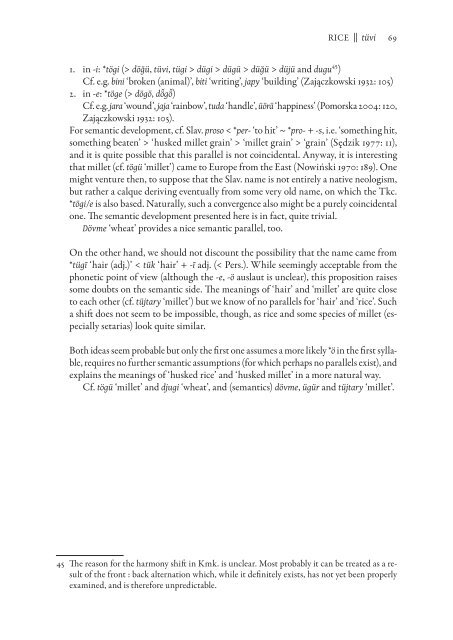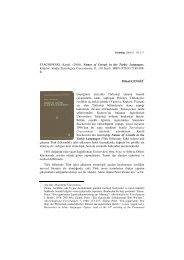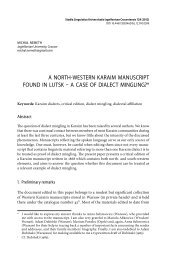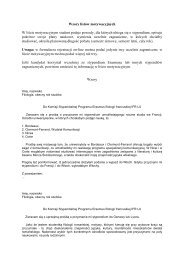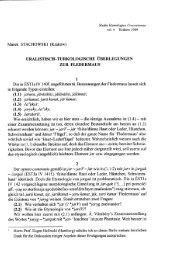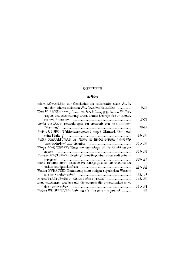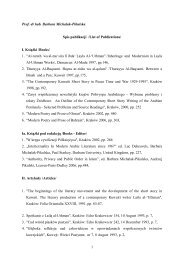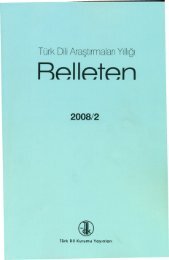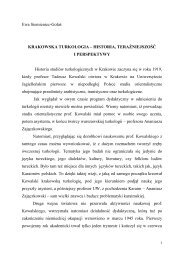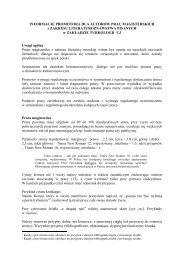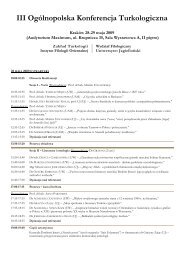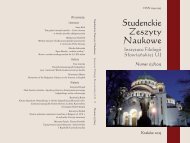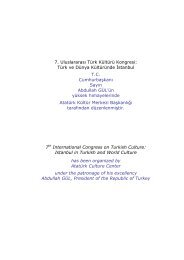Names of Cereals in the Turkic Languages - Wydział Filologiczny UJ
Names of Cereals in the Turkic Languages - Wydział Filologiczny UJ
Names of Cereals in the Turkic Languages - Wydział Filologiczny UJ
- No tags were found...
You also want an ePaper? Increase the reach of your titles
YUMPU automatically turns print PDFs into web optimized ePapers that Google loves.
Rice || tüvi 691. <strong>in</strong> -i: *tögi (> döğü, tüvi, tügi > dügi > dügü > düğü > düjü and dugu 45 )Cf. e.g. b<strong>in</strong>i ‘broken (animal)’, biti ‘writ<strong>in</strong>g’, japy ‘build<strong>in</strong>g’ (Zajączkowski 1932: 105)2. <strong>in</strong> -e: *töge (> dögö, dogo)Cf. e.g. jara ‘wound’, jaja ‘ra<strong>in</strong>bow’, tuda ‘handle’, üörä ‘happ<strong>in</strong>ess’ (Pomorska 2004: 120,Zajączkowski 1932: 105).For semantic development, cf. Slav. proso < *per- ‘to hit’ ~ *pro- + -s, i.e. ‘someth<strong>in</strong>g hit,someth<strong>in</strong>g beaten’ > ‘husked millet gra<strong>in</strong>’ > ‘millet gra<strong>in</strong>’ > ‘gra<strong>in</strong>’ (Sędzik 1977: 11),and it is quite possible that this parallel is not co<strong>in</strong>cidental. Anyway, it is <strong>in</strong>terest<strong>in</strong>gthat millet (cf. tögü ‘millet’) came to Europe from <strong>the</strong> East (Nowiński 1970: 189). Onemight venture <strong>the</strong>n, to suppose that <strong>the</strong> Slav. name is not entirely a native neologism,but ra<strong>the</strong>r a calque deriv<strong>in</strong>g eventually from some very old name, on which <strong>the</strong> Tkc.*tögi/e is also based. Naturally, such a convergence also might be a purely co<strong>in</strong>cidentalone. The semantic development presented here is <strong>in</strong> fact, quite trivial.Dövme ‘wheat’ provides a nice semantic parallel, too.On <strong>the</strong> o<strong>the</strong>r hand, we should not discount <strong>the</strong> possibility that <strong>the</strong> name came from*tügī ‘hair (adj.)’ < tük ‘hair’ + -ī adj. (< Pers.). While seem<strong>in</strong>gly acceptable from <strong>the</strong>phonetic po<strong>in</strong>t <strong>of</strong> view (although <strong>the</strong> -e, -ö auslaut is unclear), this proposition raisessome doubts on <strong>the</strong> semantic side. The mean<strong>in</strong>gs <strong>of</strong> ‘hair’ and ‘millet’ are quite closeto each o<strong>the</strong>r (cf. tüjtary ‘millet’) but we know <strong>of</strong> no parallels for ‘hair’ and ‘rice’. Sucha shift does not seem to be impossible, though, as rice and some species <strong>of</strong> millet (especiallysetarias) look quite similar.Both ideas seem probable but only <strong>the</strong> first one assumes a more likely *ö <strong>in</strong> <strong>the</strong> first syllable,requires no fur<strong>the</strong>r semantic assumptions (for which perhaps no parallels exist), andexpla<strong>in</strong>s <strong>the</strong> mean<strong>in</strong>gs <strong>of</strong> ‘husked rice’ and ‘husked millet’ <strong>in</strong> a more natural way.Cf. tögü ‘millet’ and djugi ‘wheat’, and (semantics) dövme, ügür and tüjtary ‘millet’.45 The reason for <strong>the</strong> harmony shift <strong>in</strong> Kmk. is unclear. Most probably it can be treated as a result<strong>of</strong> <strong>the</strong> front : back alternation which, while it def<strong>in</strong>itely exists, has not yet been properlyexam<strong>in</strong>ed, and is <strong>the</strong>refore unpredictable.


